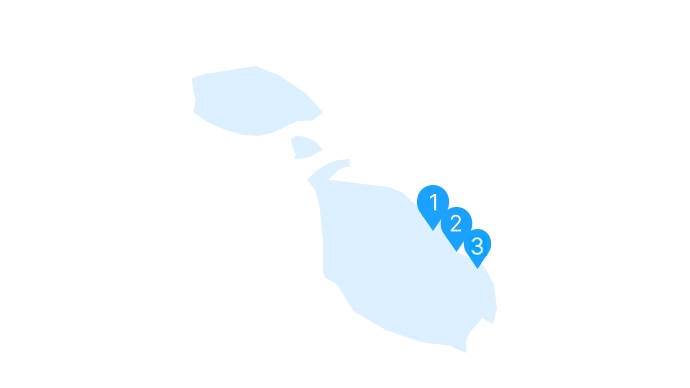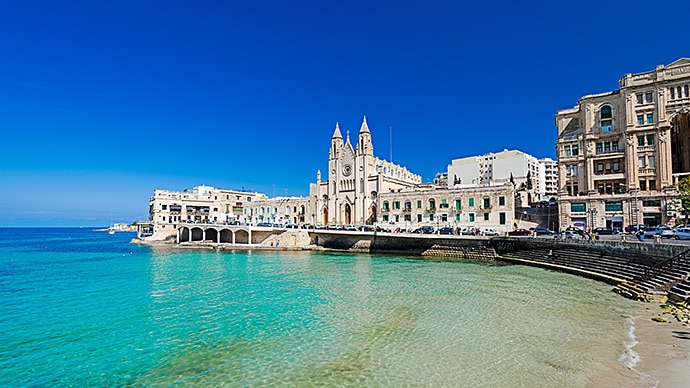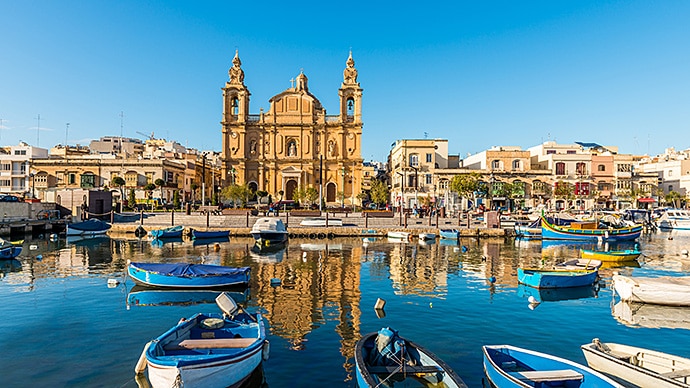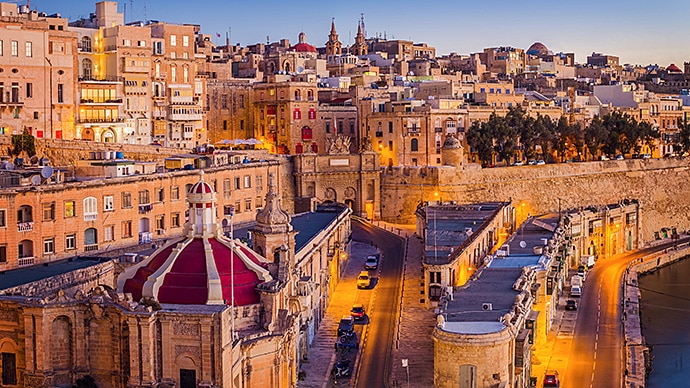Contents

Malta
Attraction
Malta, a small island country in the Mediterranean Sea, is popular as a resort destination and tourists from all over the world travel to Malta in the summer to explore its beautiful seas.
Valletta, the capital city, has been a fortress since time immemorial and the entire city is registered as a World Heritage Site - a beautiful and historical city.
In recent years, Malta has become a highly sought-after destination by international students from all over the world as a European country where English can be learned outside the United Kingdom.
Malta, an archipelago in the central Mediterranean between Sicily and the North African coast, is a country recommended for students who want to experience a meaningful study abroad experience where beautiful resorts and ancient history are blended together.
Contents
Basic Information
| Capital City | Valletta |
|---|---|
| Population | Approximately 520,000 |
| Climate | Spring: March to May Summer: June to September Autumn: October to November Winter: December to February |
| Currency | EUR |
| Official Language | Maltese, English |
| Voltage | 240V, BF-type or C-type |
| Religions | Christianity (Catholic) |
Attractions of Studying in Malta
Learning English in a multinational environment is one of the greatest attractions of studying in Malta. With easy access from European countries, Malta attracts students from Italy, Spain, Germany and many other European countries.
Despite the fact that Malta is in Europe, the cost of studying in Malta is low. People often have the impression that the cost of living in Europe is high, but in Malta the cost of living is said to be comparatively low.
Malta is an ideal choice for those who have always dreamed of studying in Europe but need to keep the costs to a minimum.
Popular Cities

-
1. St. Julian's
 St. Julian's is one of the most popular destinations for study abroad students in Malta as numerous language schools have campuses in the city.
St. Julian's is one of the most popular destinations for study abroad students in Malta as numerous language schools have campuses in the city.
The lively ambience, day and night, attracts crowds of locals and tourists, as the area is bustling with restaurants, cafes, cinemas, shopping centers, bars and clubs.
St. Julian's is the ideal location for individuals who like lively, glamorous places and who want to enjoy the Maltese and European atmosphere, as well as learning a language.
[Popular Spots]
Spinola Bay, Saint Julian's Bay, Paceville -
2. Sliema
 Formerly a fishing town with a thriving fishing industry, Sliema is now one of the most exclusive resorts in Europe. With its beautiful beaches, locals love this spot for its sunset views. >
Formerly a fishing town with a thriving fishing industry, Sliema is now one of the most exclusive resorts in Europe. With its beautiful beaches, locals love this spot for its sunset views. >
Like St. Julian's, the city is very cosmopolitan as several language schools have campuses in the city.
[Popular Spots]
Sliema Promenade, Ġnien Indipendenza (Independence Gardens), The Point Shopping Mall -
3. Valletta
 Valletta, the capital of Malta, is a city steeped in history. The entire city is registered as a World Heritage Site and is visited by countless tourists from all over the world throughout the year. The city still retains its fortified past, with its majestic and magnificent honey-colored walls known as the Malta Stone and buildings of Baroque architecture. Visitors can experience Malta's history firsthand besides learning English in the city.
Valletta, the capital of Malta, is a city steeped in history. The entire city is registered as a World Heritage Site and is visited by countless tourists from all over the world throughout the year. The city still retains its fortified past, with its majestic and magnificent honey-colored walls known as the Malta Stone and buildings of Baroque architecture. Visitors can experience Malta's history firsthand besides learning English in the city.
Although there are not as many language schools as in downtown areas such as St. Julian's, Valletta is recommended for working people and students who wish to concentrate on English study in a relaxed environment.
[Popular Spots]
St. John's Co-Cathedral, Grandmaster Palace Courtyard, Upper Barrakka Gardens
Living in Malta
Climate
The average minimum temperature in Malta is between 20 and 22 degrees Celsius while the average maximum temperature is approximately 28 to 31 degrees Celsius.
The climate is Mediterranean, with hot and dry summers and little or no rain. Winters are relatively mild and rainy.
While the climate is very pleasant throughout the year, the intensity of the sun can be quite strong and UV protection is recommended.
Prices
While prices in European countries have an image of being on the high end, prices in Malta tend to be relatively inexpensive. Particularly when it comes to dining (eating out), visitors are sure to be quite satisfied with the portions of food served, as they are voluminous for the price.
In comparison to other European countries, food costs are lower and the budgeted amount can be used to purchase gifts and souvenirs.
Public Order
Malta is a very safe and secure country. Compared to other European countries, it ranks third out of 36 countries in terms of low crime rate. Nevertheless, no matter how safe it is, one should never let one's guard down.
Visitors are advised to be cautious especially in the city at night. Malta is a country where parties are common, and when students go to Malta for study abroad programs, they will have many opportunities to go to nightclubs to hang out with friends, so it is best to be vigilant to problems such as pickpocketing, snatch thieves and violent incidents.
Estimated Cost of Study Abroad
Before Departure
| Total Amount | ¥185,250〜301,610 |
|---|---|
| Air Ticket (Round Trip) | ¥160,000〜268,000 |
| Insurance (Study Abroad Insurance) | ¥25,250〜33,610 |
After Departure
| Total Amount | ¥30,000〜50,000 |
|---|---|
| Living Expenses | ¥30,000〜50,000 |
* Airfares vary depending on the departure and arrival airports
* Tuition fees and accommodation expenses vary depending on the selected school
* Costs of living for study abroad programs differ individually